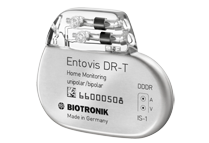
January 22, 2013 — Biotronik announced that the U.S. Food and Drug Administration (FDA) has approved, with conditions, the ProMRI clinical trial via an Investigational Device Exemption. Biotronik is sponsoring the trial (NCT01761162) and has already initiated U.S. site recruitment. The ProMRI clinical trial is designed to recruit 245 subjects implanted with one of Biotronik’s cardiac devices that include ProMRI technology at 30 U.S. investigational centers.
The ProMRI clinical trial will evaluate Biotronik’s Entovis dual- and single-chamber pacemaker systems after exposure to magnetic resonance imaging (MRI). These systems, which include Biotronik’s current pacing leads, are already approved in the United States. The trial will test the safety and effectiveness of the Entovis pacing system in patients undergoing MRI scans under predetermined conditions. The ultimate goal of the trial is to determine whether patients with these devices can safely undergo MRI scans. This could, in turn, provide access to important scanning procedures that will meet the future medical needs of patients implanted with Biotronik pacemakers.
ProMRI investigator Leon Feldman, M.D., at Eisenhower Memorial Hospital in Rancho Mirage, Calif., points out that, “While Entovis is not the first pacemaker proven safe in the MRI environment, if the endpoints are met, it will be the first device that includes all the modern features and capabilities electrophysiologists expect to have available in pacemakers and leads.” Feldman implanted the first Entovis system in a U.S. patient on Dec. 2, 2012.
Additional Entovis implants have already been performed by Timothy Shinn at St. Joseph Mercy Hospital, Ann Arbor, Mich., and by Seth Goldbarg at New York Hospital Queens, Flushing, N.Y. and by Jagmeet Singh at Massachusetts General Hospital, Boston, Mass.
Entovis devices are renowned for their ability to provide the most advanced physiological therapy available via Biotronik’s proprietary Closed Loop Stimulation (CLS) and Biotronik Home Monitoring technologies. Biotronik’s active-fixation pacing leads have a flexible distal end, fractal coating, and steroid elution to provide excellent handling and stable fixation, as well as optimal electrical performance.
Several million patients currently are implanted with pacemaker systems worldwide. Previously published studies [1,2] have projected that a sizeable proportion of these patients will develop a clinical need for an MRI scan during their lifetime. However, the strong forces applied during MRI have the potential to affect the pacemaker system negatively and, consequently, the patient’s safety. Therefore, these diagnostic scans currently are not recommended in patients with a pacemaker. Because MRI scanning often provides improved diagnostic capabilities for certain diseases or conditions that cannot be adequately examined by other imaging modalities, such as X-ray, computerized tomography (CT) or ultrasound, MRI compatible pacemaker systems are essential to comprehensive medical care.
"We are excited about demonstrating the safety of our pacemakers in the MRI environment," said Kevin Mitchell, vice president of Clinical Studies for Biotronik. "Estimates indicate that as many as 75 percent of patients implanted with pacemakers may require an MRI scan, and we look forward to ensuring that these patients have access to the procedure with the most technologically advanced pacemaker available."
The ProMRI clinical trial is the first of several studies planned by Biotronik to obtain safety and effectiveness data for its complete portfolio of cardiac rhythm devices with MRI conditional labeling, which the company intends to submit to review for approval by the FDA.
References
1 Morgan Stanley, ICD market, 1996–2009.
2 Roguin et al., Europace 2008, 10, 336-346.
For more information: www.biotronik.com


 January 05, 2026
January 05, 2026 









